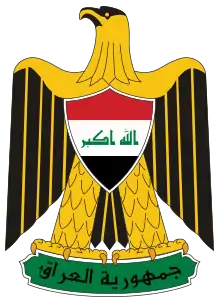Prime Minister of Iraq
The Prime Minister of Iraq is the head of government of Iraq. On 27 October 2022, Mohammed Shia' Al Sudani became the incumbent prime minister.
| Prime Minister of the Republic of Iraq | |
|---|---|
 | |
| Council of Ministers of the Republic of Iraq Executive branch of the Federal Government of the Republic of Iraq | |
| Style | His Excellency |
| Type | Head of government |
| Residence | Republican Palace, Baghdad |
| Seat | Al Zaqura Building |
| Appointer | President of Iraq |
| Term length | Four-year term, renewable[1] |
| Formation | 11 November 1920 |
| First holder | Abd Al-Rahman Al-Gillani |
| Salary | 140,000,000 Iraqi dinars/96,552 USD annually[2] |
| Website | Official website |
 |
|---|
|
|
| Constitution |
|
|
History
The prime minister was originally an appointed office, subsidiary to the head of state, and the nominal leader of the Iraqi parliament. Under the 2005 constitution the prime minister is the country's active executive authority. Nouri al-Maliki (formerly Jawad al-Maliki) was selected to be prime minister on 21 April 2006.[3][4] On 14 August 2014, al-Maliki agreed to step down as prime minister of Iraq to allow Haider al-Abadi to take his place.[5] On 25 October 2018, Adil Abdul-Mahdi was sworn into office five months after the 2018 elections until his resignation in 2019.[6] He was once again appointed, this time as a caretaker prime minister due to political dispute. Abdul-Mahdi was replaced by Mustafa Al-Kadhimi, who was approved by the parliament on 7 May 2020.[7] Al-Kadhimi was replaced by Al-Sudani after the 2021 Iraqi parliamentary election.
Appointment
After an election, the Council of Representatives elects the president of the Republic and his deputies, including the president of the Council of Ministers. The Presidency Council must then name a prime minister unanimously within two weeks. If it fails to do so, then the responsibility of naming the prime minister reverts to the National Assembly. In that event, the Council of Representatives must confirm the nomination by an absolute majority. If the prime minister is unable to nominate his Council of Ministers within one month, the Presidency Council must name another prime minister.
Though not official, the appointment to the post has needed at least tacit approval from both the United States and Iran in recent times due to the influence of those countries on Iraqi politics.[8]
Agencies directly subordinate
The Iraqi Counter Terrorism Bureau reports to the prime minister directly. The Iraqi CTB oversees the Iraqi Counter Terrorism Command, a formation that includes all Iraqi Special Operations Forces. As of 30 June 2009, there had been legislation in progress for a year to make the Iraqi CTB a separate ministry.[9]
Seat
The prime minister's office is located in the Al Zaqura Building in Baghdad.
References
- "Iraqi lawmakers pass law to block Maliki from third term". Reuters. 26 January 2013. Retrieved 6 April 2018.
- "Names and figures .. salaries of the heads of the world".
- Iraq parliament elects new leaders CNN, 22 April 2006
- Maliki endorsed as new Iraqi PM BBC News, 22 April 2006
- "Maliki gives up Iraq PM job to rival". www.aljazeera.com. Al Jazeera and agencies.
- "Prime Minister Abdul-Mahdi sworn in with 14 ministers, so far". Rudaw.net. 16 June 2015. Retrieved 27 October 2018.
- "Mustafa al-Kadhimi sworn in as prime minister of Iraq". Rudaw. 7 May 2020. Retrieved 7 May 2020.
- Yee, Vivian; Rubin, Alissa J. (19 March 2023). "In U.S.-Led Iraq War, Iran Was the Big Winner". The New York Times. ISSN 0362-4331. Retrieved 8 June 2023.
- Montrose Toast, Iraqi Counter Terrorism Bureau, 30 June 2009
_in_Mashhad_(cropped).jpg.webp)